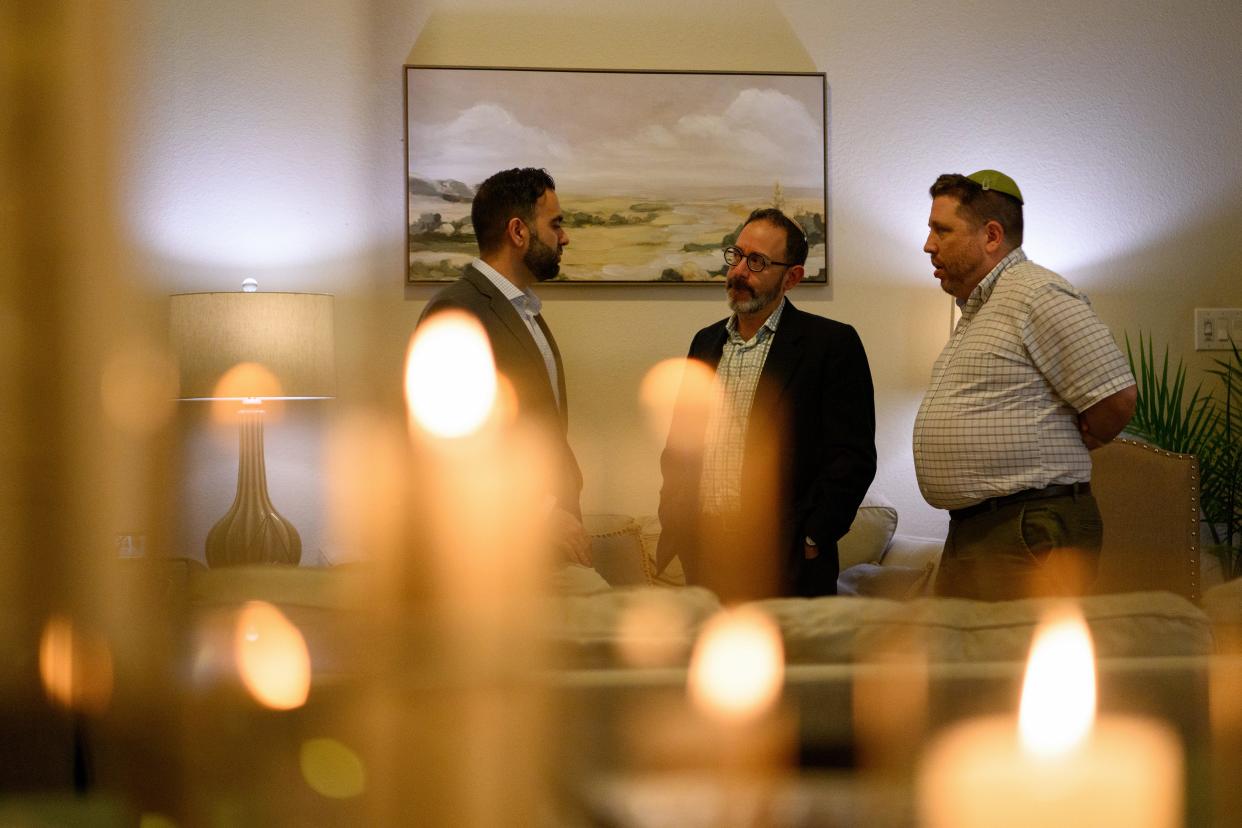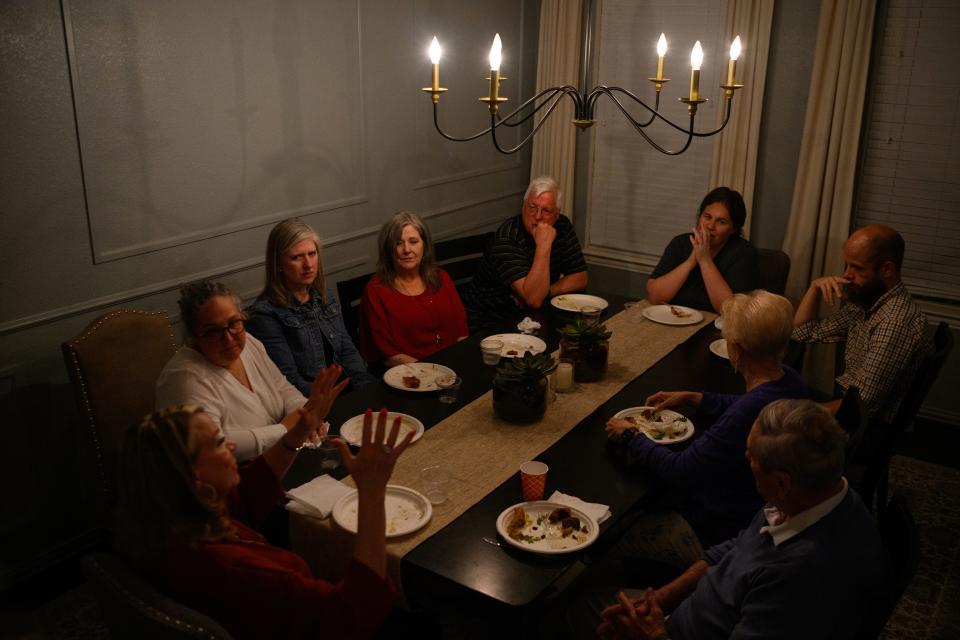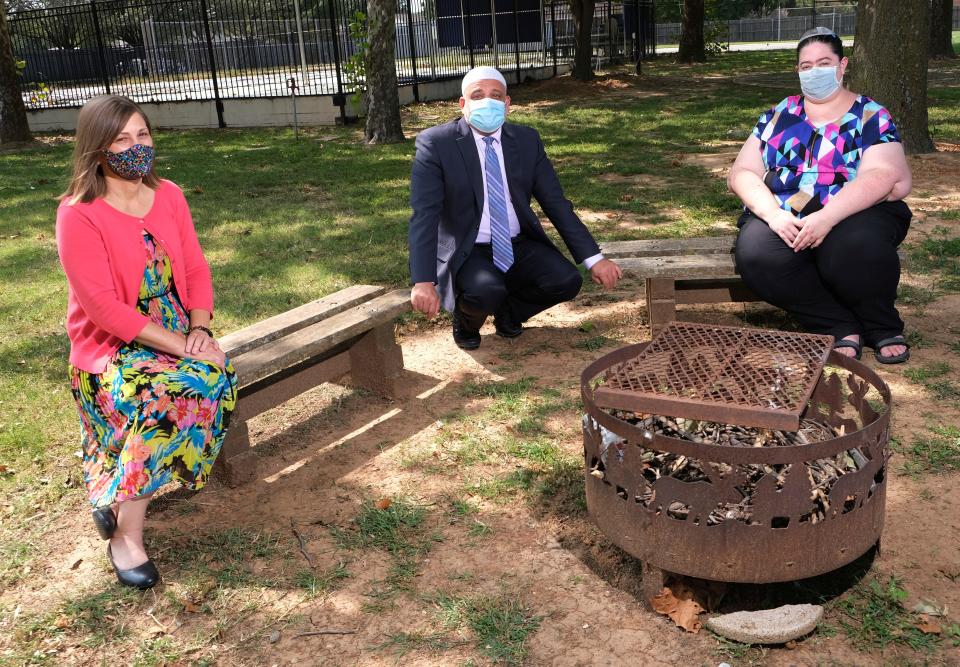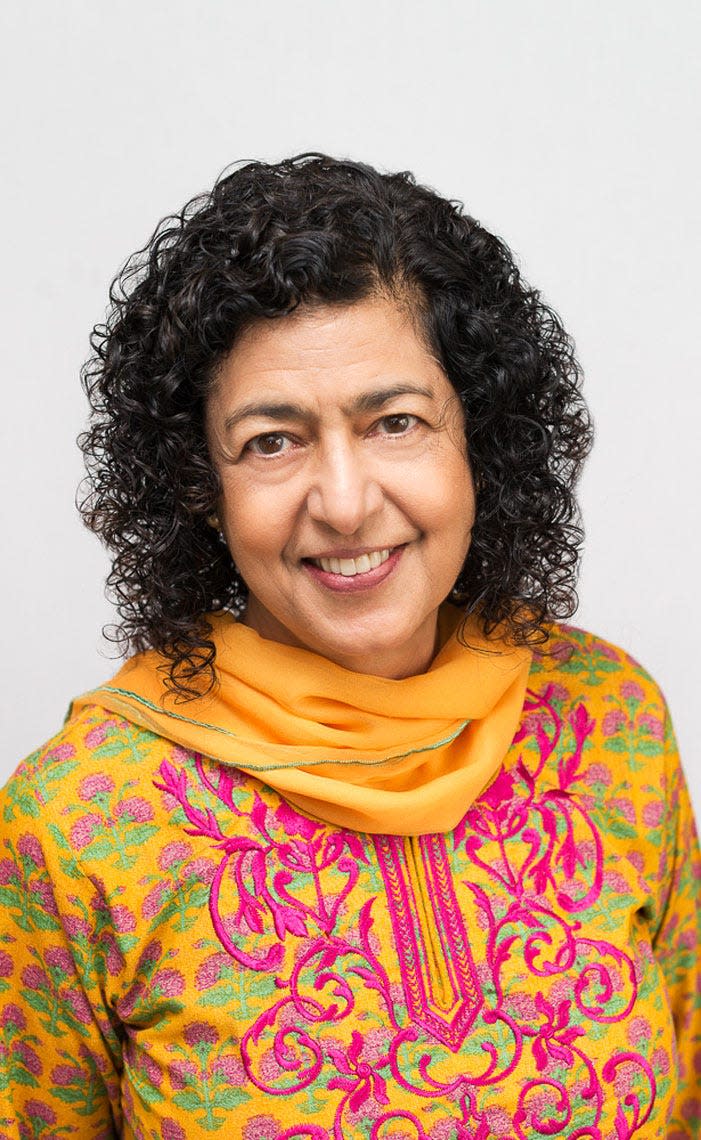As war in Gaza tests interfaith bonds in the US, some find ways to mend relationships

RICHMOND, Texas – Shariq Ghani and Steven Gross are longtime friends who have had their knockdowns over the conflict in Gaza, but they say the arguments have only improved their relationship.
Not necessarily the communities they represent.
The war’s brutality and seven decades of acrimony between Israel and Palestinians have exacerbated tensions among communities in the United States. And that’s why Ghani, a Muslim interfaith leader, and Gross, a Reform Jewish rabbi, were among several dozen imams, pastors, rabbis, ministers and others gathered at Ghani’s house in suburban Houston this week at a Ramadan iftar dinner for friends and family.
Ghani and Gross believe their personal relationship can be a model for their larger communities.
“We can overcome our differences,” said Ghani, executive director of Houston’s Minaret Foundation, an interfaith social justice organization. “And people have to know that.”
But tensions triggered by the war have chipped away at such solidarity, even in places like Oklahoma City, where interfaith roots date back to the 1995 bombing of the downtown federal building.
In Houston, mindful of raw emotions, the Minaret Foundation and the Houston Congregation for Reform Judaism scrapped their annual Muslim-Jewish Christmas potluck, and last month, the Houston chapter of the Council on American-Islamic Relations withdrew its support of the city’s annual Ramadan dinner because Mayor John Whitmire, the event’s keynote speaker, had not called for a cease-fire in Gaza.
The situation underscores the challenges for interfaith alliances, particularly those among Jewish and Muslim communities, as the war’s casualties and destruction continue to mount. More than 30,000 Palestinians have been killed by Israeli military operations in response to Hamas raiding southern Israel on Oct. 7, killing about 1,200 people.
“This crisis is draining us down,” said Almas Muscatwalla, board chair for the Texas Muslim Women’s Foundation and a member of the Dallas-Fort Worth Muslim Jewish Advisory Council.
For some, the conflict is a dividing line so rancorous they’ve gone into full retreat; for others, it’s a conversational land mine best avoided.
“Many have abandoned relationships completely, feeling either afraid to engage or, more commonly, such anger about the situation that they don’t have the heart to hear the narrative of the other,” Gross said. “There’s a complete dismissal of the other’s pain.”

Some fear fraying relationships may have a greater cost. Antisemitic incidents in the U.S. surged during the conflict’s first three months, more than quadruple compared to the year prior, according to data collected by the Anti-Defamation League.
Meanwhile, the Council on American-Islamic Relations this week released a report detailing what it called the worst wave of Islamophobia in its 30-year history.
“If all partners were still at the table, there would be more action against those things,” said Mehnaz Afridi, a professor of religious studies who directs the Holocaust, Genocide and Interfaith Education Center at Manhattan College in New York City. “But because of this fracturing, there’s little pushback. This conflict has pulled us apart in a really deep and terrible way.”
Through one-on-one conversations and settings such as the iftar gathering in Houston, interfaith groups and individuals are trying to nudge their communities beyond politics while laying the groundwork for the healing they hope will follow.
“This is a time of massive secondary trauma for both of our communities,” Ghani said. “In trauma situations, it’s fight, flight or freeze, and that doesn’t accommodate forging of new relationships. It’s been challenging. But it’s also been an opportunity to test the waters and see how far the conversations can go.”

In tragedy and chaos, the roots of one city's interfaith community
On the morning of April 19, 1995, a bomb exploded inside a rented truck parked in front of the Alfred P. Murrah Federal Building in downtown Oklahoma City, killing 168 people and injuring hundreds more. In the immediate aftermath of what would be the worst act of domestic terrorism in U.S. history, speculation mistakenly centered on two Middle Eastern men as possible suspects.
One of them was former Palestinian refugee Imad Enchassi, now chair of Islamic Studies at Oklahoma City University, who in the turmoil would be among those in the city’s budding Muslim community to become targets of Islamophobia before the arrest of extremist and white supremacist Timothy McVeigh. McVeigh was convicted of the bombing along with accomplice Terry Nichols.

In response to the threatening atmosphere, the city’s faith communities coalesced in support of its emerging Muslim community.
“The bombing was a turning point for the interfaith community here in Oklahoma City,” said Enchassi, who is also a senior imam at the Islamic Society of Greater Oklahoma City. “We have what I call a 'faith NATO': An attack on one faith is an attack on all faiths.”
Those bonds formed the roots of a community that has solidified over time. In 2015, when protesters threatened to disrupt Oklahoma City’s first Muslim Day at the Capitol, hundreds of Jews, Christians, Sikhs and Hindus showed up to support their Muslim brethren.
“A lot of roots sprung out of that tragedy, and one of them is interfaith conversation and engagement,” said the Rev. Shannon Fleck, executive director of the Oklahoma Faith Network. “What we have found in speaking to colleagues across the country is that’s not always the case. But Oklahoma City’s interfaith community is so close and tight-knit because we have to be.”
The war in Gaza, however, embodies the community’s biggest challenge in some time, said Adam Soltani, executive director of the Council on American-Islamic Relations’ Oklahoma chapter.
“Some relationships have fractured and broken down,” Soltani said. “People are taking time out, not sure how they feel … Many want to move forward and recognize that what’s happening halfway across the world should not affect our relationships.”
Soltani hopes the impasse will end before long and said the challenge will be creating a safe space for differing perspectives while providing context for a conflict that has raged off and on for seven decades.
“People are wanting to not just have kumbaya moments where we pat each other on the back," he said. "What I’m seeing – especially in the younger generation – is that they want to have these conversations; they don’t want to pretend that everything is great.”

'There's much more that unites us than divides us'
At Cornell University in New York, where Jewish students represent about 1 in 4 undergraduates, emotions simmered as the war progressed. Banner-filled protests raged on the quad, and several weeks into the conflict, federal authorities arrested a Cornell student on charges of allegedly making violent antisemitic threats online.
“That makes for a pretty tense environment,” said student alliance member Aaron Friedman, a junior government major from New Jersey. “People don’t necessarily see eye to eye. There’s a lot of disinformation being spread.”
After one campus demonstration late last year, students on both sides lingered afterward, engaged in dialogue. The exchanges proved productive, and the students thought: Why not formalize the interaction and keep it going?
That led to the formation of Cornell’s Jewish Muslim Alliance.
“We wanted to establish a more personal relationship between communities, so we can address things from a more open-minded standpoint and not have it turn into a shouting match,” said Mikhail Essa, a 20-year-old junior majoring in applied economics and management.
In February, the group held an interfaith dinner, intending to bridge divides by bringing students together over kosher and halal food.
While tables were given prompts to guide discussion, most dialogue was left to students. Friedman shared his unique perspective as the son of a Russian Jewish father and Turkish Muslim mother, and aside from one table at which several Muslim attendees challenged the political views of a Jewish counterpart, he said, the discussion was largely low-key.
Essa said the alliance has helped him understand the conflict through the eyes of his Jewish classmates, and Muslim and Jewish students have discovered what their communities have in common, from dietary restrictions and holy sites to concerns about being targets for hate.
“There’s much more that unites us than divides us,” Essa said. “In order to have difficult conversations down the road, it’s easier to have those with people who are your friends rather than with someone you barely know.”
Among the strongest interfaith bonds Essa has built at Cornell is with Joe Regenstein, a professor emeritus with decades of research in food science. A chance meeting on campus led to a chat in which Essa expressed his desire to see more halal food in the dining halls. Regenstein, who is Jewish, encouraged Essa to get involved in campus food operations.
“He’s been like a grandfather to me,” said Essa, who chairs a campus subcommittee on dietary restrictions.
When the conflict broke out, Essa and Regenstein each reached out to make sure the other was OK, and the two still make time to share occasional meals, discussing updates in the war.
“I had to share what my thinking was and hear what his thinking was … I do not support what Israel is doing but I understand why they feel very strongly that they have to do it," Regenstein said. "He cannot condone what Hamas did, but many students can’t. We don’t focus on the Middle East, but as things change, we feel comfortable talking about it.”

The challenges of finding common ground
Walter Ruby, who has done interfaith work since 2006, has seen faith communities unite after incidents such as the October 2018 mass shooting at the Tree of Life synagogue near Pittsburgh or in response to issues like the former ban imposed by former President Donald Trump on travelers from several majority-Muslim countries. But that cohesion has faded in recent years, he said, with rising Middle East conflict.

Ruby is president of a Washington-based group called Jews and Muslims and Allies Acting Together, which held an October rally expressing unity and calling for peace. Ruby recalls it as a powerful gesture, despite some members’ ire over the group’s failure to call for a cease-fire.
“The thought of trying to do that again – ugh,” he said. “It cost us so much internally to make that happen.”
Ruby and former hospital administrator Sabeeha Rehman, who is Pakistani American, have been working for years to promote Muslim-Jewish relations in the U.S. The pair in 2021 released a book, “We Refuse to Be Enemies: How Muslims and Jews Can Make Peace, One Friendship at a Time.”
The ongoing conflict has made them popular on the speaking circuit, where they’ve addressed rabbinical students, interfaith groups and houses of worship.
“We cannot allow the conflict in the Middle East to divide us at home,” Rehman said. “We are building those bridges despite what’s going on.”
Back in suburban Houston, Ghani’s 10-year-old son made the call to prayer as the sun slipped away. The group of several dozen continued conversations over plates of kibbeh, shawarma and falafel, chatting about interfaith projects, career moves, and spring ambitions.
“Relationships are nurtured one-on-one,” said Gross, the Reform rabbi. “Each of our relationships have broader circles and when we’re able to bring them together, it’s an ever-expanding arena of collaboration.”
Ghani said he and Gross remind people that American Jews and Muslims are not at war with each other despite the pain felt on both sides; they counsel others to focus on compassion rather than winning debates, a strategy they compare to marriage counseling.
“You’ve got to talk about the problem to address or move past it,” Ghani said. “We’re not going to solve the war overseas. But we can ensure that we live in harmony here.”
This article originally appeared on USA TODAY: Israel-Hamas war: As US interfaith ties fray, some keep bonds alive
